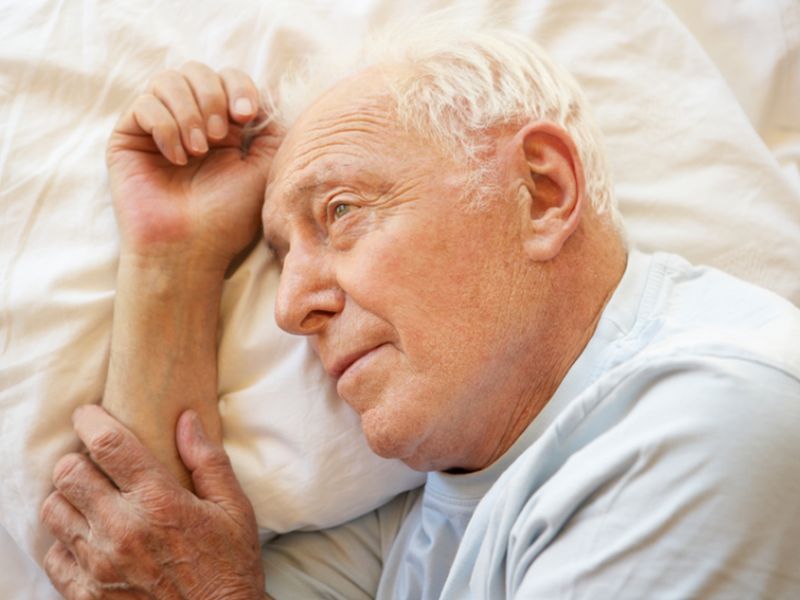MONDAY, April 26, 2021 (HealthDay News) — Music hath charms to soothe you off to slumber, new research suggests.
The study found that calming tunes at bedtime seem to help older people struggling with insomnia.
“We found music therapy was effective for older adults with sleep disturbance,” said study co-author Yen-Chin Chen, an associate professor of nursing at National Cheng Kung University in Tainan, Taiwan.
That’s one of three takeaways from the study.
“Second, listening to sedative music is more effective than listening to rhythmic music,” Chen said. “And listening to music for longer than four weeks is more effective for older adults with sleep disturbance.”
Getting enough sleep can improve a person’s thinking and memory function, as well as energy levels, Chen said.
The findings were published online April 20 in the Journal of the American Geriatrics Society.
The study authors noted that adults aged 60 and up appear to sleep better when they listen to music for 30 minutes to an hour at a time, and that they see the greatest benefit by trying tunes for at least a month.
For the review, the researchers looked at five studies with 288 participants.
About half of the participants listened to bedtime music. The rest either had other treatments for their sleep problems or none at all. The research compared different treatments to music, and rhythmic music to calming music.
Listening to calming music, which has a slower tempo and smoother melody, resulted in better sleep, the investigators found. By slowing your heart rate and breathing, and lowering your blood pressure, calming music can lower your stress and anxiety, the researchers theorized.
Older adults need seven to nine hours of sleep each night, according to the U.S. National Institute on Aging.
About 40% to 70% of older adults have sleep problems, and about 40% experience insomnia, waking often during the night or too early in the morning, the study authors noted in the report.
Sleep problems can contribute to irritability and depression, cause memory problems, and lead to falls and accidents.
Dr. Alayne Markland, an associate professor of medicine in the division of gerontology, geriatrics, and palliative care at the University of Alabama, Birmingham, reviewed the findings.
“I think this is novel work,” she said, adding that more work remains, especially with older adults who have thinking and memory issues. The study did not include people with Alzheimer’s disease, Parkinson’s disease or other neurologic conditions.
“This could be a good thing to try — we just don’t have that data,” Markland said. Music could be a very effective sleep aid for some folks, as long as they don’t leave it on all night long, she added.
Sleep is an important driver of metabolism, activity levels, social interaction and mental health for seniors, so getting recommended amounts is important, Markland stressed.
It’s hard to say based on these findings alone who might be better suited to other strategies, such as cognitive behavioral therapy for insomnia (CBTI) with a trained professional, Markland said. CBTI can target behaviors around falling asleep and staying asleep.
According to a research summary from the American Geriatrics Society, one limitation of the study was that people who listened to music received more attention from researchers, which could be why their sleep improved. Also, all of the study participants had similar sleep problems, so this music strategy many not help folks who are struggling with sleep for other reasons.
Dr. Rafael Pelayo, a sleep specialist at Stanford Sleep Medicine Center in California, noted that most older people who are healthy don’t have any sleep issues at all. Some have poor sleep as a result of other medical conditions, he added.
For example, someone with cataracts may sleep poorly because less light goes into their eyes, which can influence their sleep-wake cycles, he explained. Menopause, depression, sleep apnea, thyroid issues or iron deficiency can also cause sleep issues.
And over time, poor sleep can become a habit, Pelayo pointed out.
People who experience chronic pain or post-traumatic stress disorder have particular sleep challenges, but there are tools to help with even those sleep issues, according to Pelayo.
“There are many reasons an older person may sleep poorly,” he said. “Having said that, most of the conditions will improve when addressed correctly.”
Pelayo sees the greatest potential for music as a sleep aid in those whose sleep issues are stress-related. The predictability of music can help these folks get into the right state of mind and promote serenity, he said.
“People should go to bed, feeling safe, comfortable and loved. That’s the state of mind you want to be in: safe, comfortable and loved,” Pelayo said. “That’s how our children sleep and that’s what we hope to provide our kids and you need to provide for yourself. If you go to bed thinking ‘How bad will it be tonight?’ that will make you sleep lighter.”
More information
The Sleep Foundation offers more suggestions for seniors and sleep.
SOURCES: Yen-Chin Chen, PhD, associate professor, nursing, College of Medicine, National Cheng Kung University, Tainan, Taiwan; Alayne Markland, DO, MSc, associate professor, medicine, division of gerontology, geriatrics and palliative care, University of Alabama at Birmingham, and clinician-researcher, Birmingham VA Medical Center, and director, clinical programs, Birmingham/Atlanta Geriatric Research, Education, and Clinic Center; Rafael Pelayo, MD, sleep specialist, Stanford Sleep Medicine Center, Redwood City, Calif.; Journal of the American Geriatrics Society, April 20, 2021, online
Copyright © 2026 HealthDay. All rights reserved.

